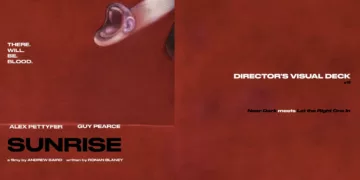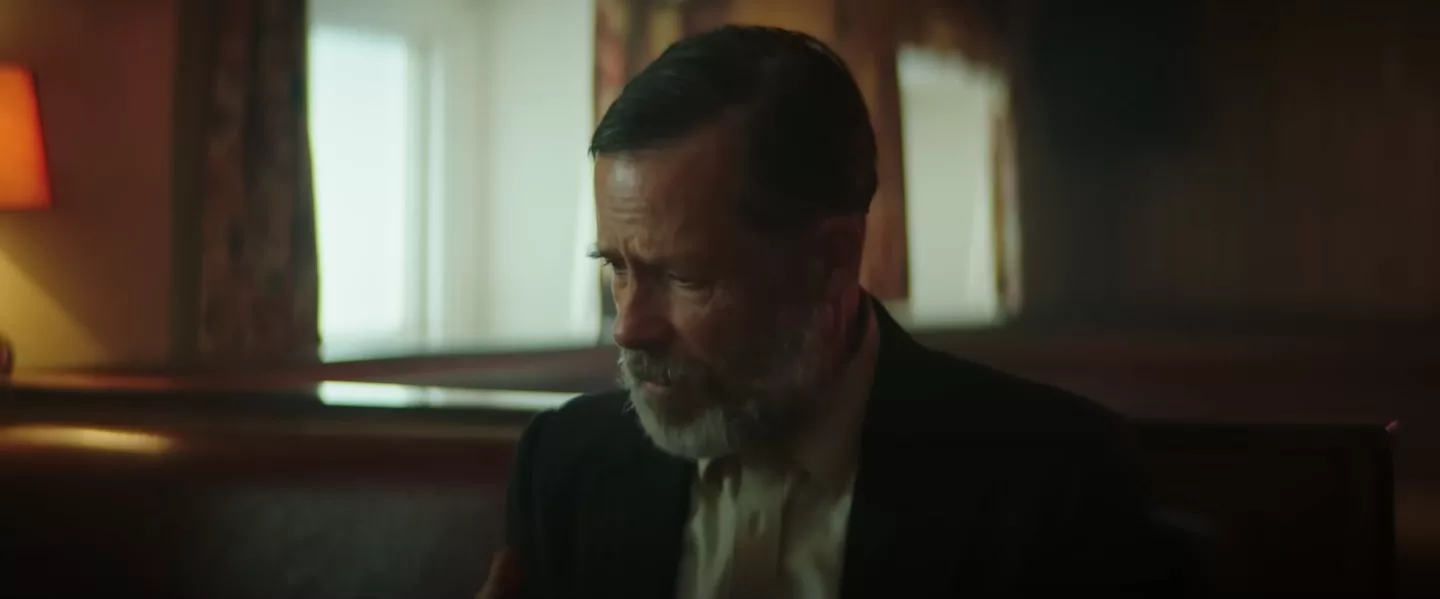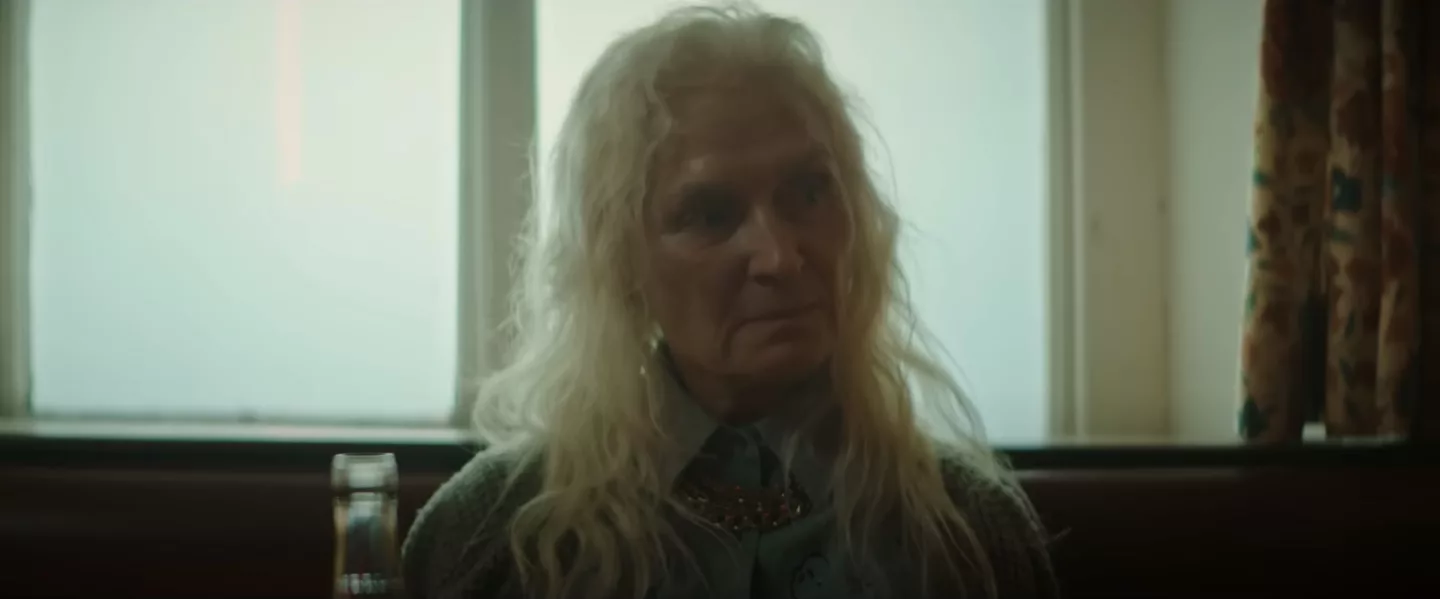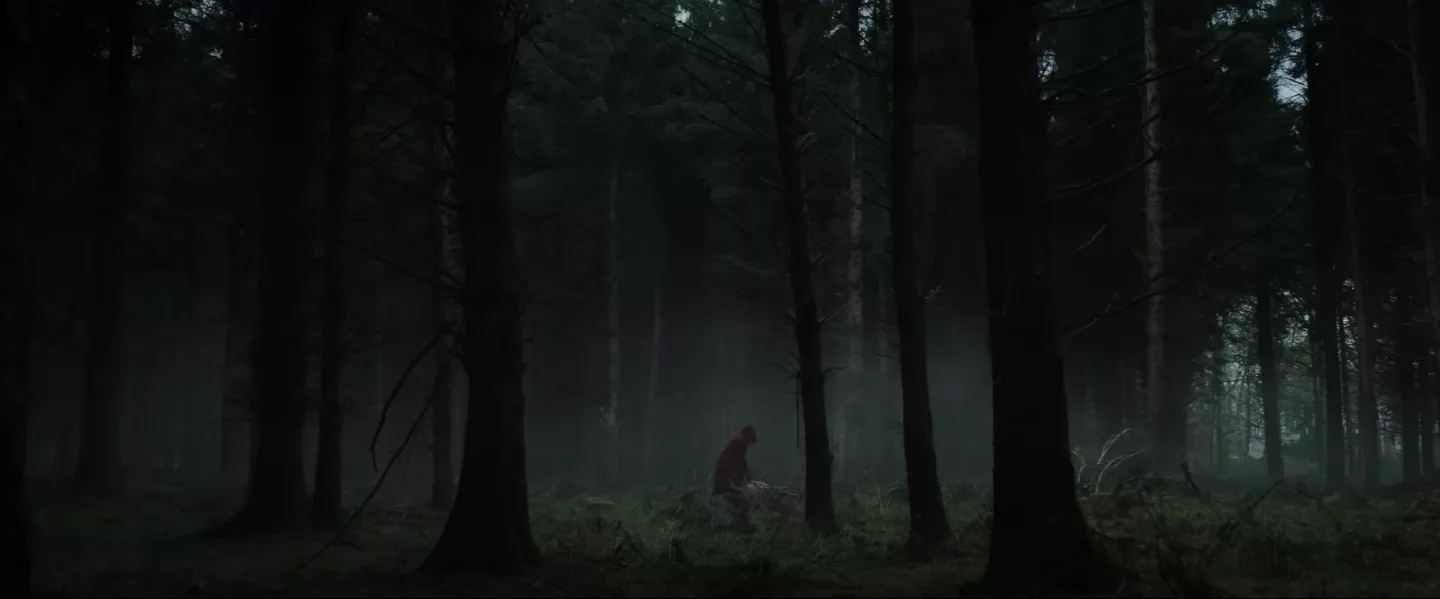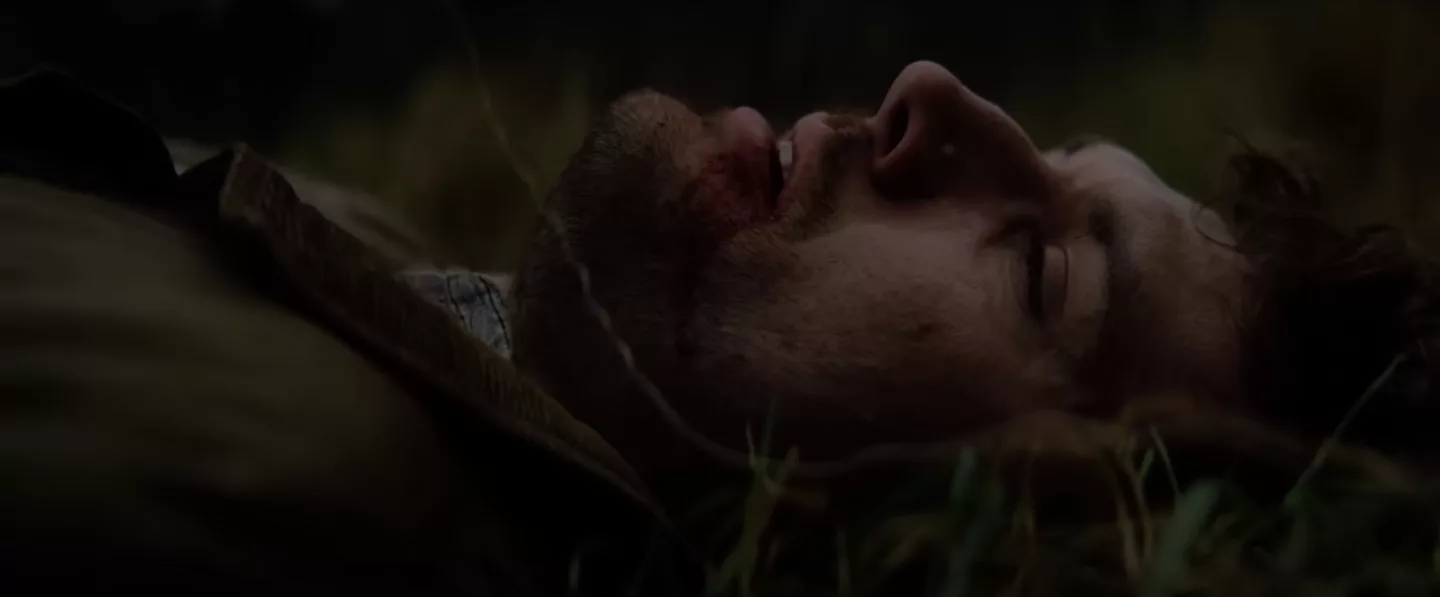Vampires, demons, and the thirst for vengeance. These pillars prop up the nightmarish foundations of director Andrew Baird’s horror-thriller Sunrise. Hitting theaters in January 2024, this eerie flick sounds an ominous alarm as soon as the sun slips below the towering pines.
We open on the Loi family, struggling Asian immigrants in the Pacific Northwest whose encounters with the racist local crime lord, Reynolds, turn hostile. After Loi defies Reynolds’ attempts to snatch the family farm, this hot-tempered villain retaliates severely. In the aftermath, the Lois alone must navigate Reynolds’ continued harassment and intimidation. However, the mysteries compound upon the arrival of Fallon, a sullen, trenchcoat-wearing drifter with a troubling appetite. Is he a supernatural entity…or something far more sinister?
With sinister small-town secrets buried in its soil, Sunrise twists together sledgehammer horrors and slow-burn dread. Pearce brings the hate as the film’s bullying baddie, while newcomers Gao and Yu lend heart as defiant son Edward and courageous mother Yan. With Pettyfer brooding ominously as the blood-hungry Fallon, the stage is set for a violent, engrossing showdown. But does this atmospheric fright-fest stick the landing? Grab some garlic and a flashlight, because we’re venturing into Sunrise’s shadows. Just pray the daylight saves you.
A Small Town Masks Big Evils in This Revenge Thriller
On the surface, Sunrise looks like your typical sleepy rural town. But peering into its shadows reveals a hotbed of racism, corruption, and supernatural secrecy. This character-driven revenge thriller from director Andrew Baird simmers with social commentary as it pulls us into a ten-year web of lies, loyalty, and occult evil.
At the rotten core of this isolated community lurks Reynolds – a greedy, bigoted crime boss who wields fear like a cudgel. When Asian immigrant Loi rejects Reynolds’ underhanded offers to snatch his family’s farm, things take a violent turn. In the aftermath, Loi vanishes without a trace as his wife and children struggle under Reynolds’ campaign of intimidation. Bullied son Edward seethes for justice while resolute mother Yan refuses to cave to the criminal’s threats.
Enter Fallon – a pale, peculiar drifter whose sudden arrival raises eyebrows. Is he connected to Reynolds’ web? Or does his talk of blood sacrifices and Native legends hint at a supernatural origin? Fallon’s tense ties with the Lois deepen after he defends them from Reynolds’ goons. But can they trust this tomb-quiet stranger with a shadowy past?
Through fragmented flashes, we rewind to pivotal events from a decade prior. Back when Reynolds’ racism first took root…when Fallon walked a darker path as sheriff…and when occult forces left an indelible mark on both men. These gripping glimpses into the past peel back the layers of mystery enshrouding Fallon while highlighting the cyclical nature of hatred.
Layer by layer, Sunrise braids themes of corruption, redemption, and outsider persecution into an atmospheric slow-burn chiller. Reynolds personifies the festering demon of prejudice – a monster hiding behind a badge and dollar signs. Additionally, Fallon symbolizes the grey morality that often shadows acts of vengeance. Baird and writer Ronan Blaney drag social ills like racism, xenophobia, white supremacy, and insatiable greed into the pitiless light. There are no black hats or white hats here…only shades of murky grey.
Sunrise sustains its ominous edge courtesy of the rural Pacific Northwest – all looming pines, fog-veiled valleys, and ramshackle barns concealing grisly secrets. Dread percolates through every cinematic frame as this revenge thriller seeds paranormal terror into the real-life horrors of hatred and corruption. It aspires to resonate like 1980s horror fare The Fog or Near Dark while speaking to the modern demon of discrimination.
Yet despite thematic ambition, execution stumbles. Flashback overuse disorients more than intrigues, diminishing momentum as the climax creeps closer. And atmospheric allure aside, the pacing drags like a zombie with two left feet. As the runtime winds down, Sunrise struggles to bring its complex threads together for an impactful finale. But the journey getting there will leave heads spinning with sociopolitical commentary, rural horror, and morally ambiguous players cat-and-mousing towards a final showdown ten years in the making.
Compelling Performances Anchor an Uneven Character Tapestry
Sunrise thrives courtesy of Guy Pearce’s venomous villainy as Reynolds – a character boiled in bigotry and brimming with bullish menace. Pearce fully commits to depicting this unapologetic racist, spewing vitriolic monologues that cut to the core of Reynolds’ warped worldview. We despise this scenery-chewing villain yet cannot peel our eyes away.
Meanwhile, Alex Pettyfer broods with quiet intensity as the cryptic Fallon. This pale-faced nomad speaks little but conveys worlds with his thousand-yard stares and gravitas-laden frame. Pettyfer leaves heads spinning over Fallon’s motives and origins, teasing paranormal roots that are never fully watered.
Newcomer William Gao also impresses as Edward – Reynolds’ high school-aged punching bag. We ache as Gao depicts Edward’s isolation and seething helplessness. Crystal Yu radiates courage and maternal love as his steadfast mother, Yan, refusing to surrender their farm despite Reynolds’ threats. Young Riley Chung rounds out the central quartet as Edward’s innocence-incarnate sister.
Yet for all the praise, Sunrise drops balls too. Fallon remains an enigma we never fully unravel, denying catharsis over his vampiric hints. And Reynolds’ vile monologues feel spoon-fed rather than organic, as if highlighting rather than trusting the audience’s intelligence. We never glimpse depth beyond his racist core.
Additionally, an undercooked romance between Edward and Reynolds’ daughter Valeria lacks payoff, while Olwen Fouere’s occult-dabbling Ma Reynolds begs further exploration. These dangling threads hint at deleted character dimensions while denying satisfying closure.
In summary, Sunrise harbors stellar central turns from Pearce, Pettyfer and the two newcomers. Reynolds seethes while Fallon intrigues; Edward empathizes while Yan perseveres. Yet the script sells peripheral players short, denying fulsome dimensionality. Like sunlight piercing a vampire’s flesh, these deficits drain tension from the brooding narrative bloodstream. But the core quartet’s chemistry and conviction keeps our pulses pounding as we root for redemption…or vengeance.
Slick Style Cannot Disguise Narrative Cracks
Helmer Andrew Baird flexes atmospheric muscle with Sunrise’s rural Pacific Northwest playground. Fog-swirled valleys and landscapes lush with towering pines immerse us in dread-steeped isolation. DP Ben Nott’s cinematography pops with color and shadow, spotlighting the region’s natural splendor between beats of paranormal horror.
This creepy setting breeds a persistent chill. Silhouettes of bare trees and abandoned barns hints at grisly secrets in the soil. And Baird amplifies the unease through stylized visuals like dust motes dancing in rays of light piercing the darkness. It augments the dreamlike quality woven through flashbacks to events from ten years prior.
Yet at times, Baird mistakes more style for substance. Overdone lighting diffuses tension rather than focusing it, while disjointed editing dulls narrative momentum. The constant temporal ping-ponging seeks intrigue yet disorients, denying seamless immersion into this rural nightmare.
The script’s thematic complexity leaves Baird juggling one too many ingredients, resulting in a scattered final dish. Tonal fluctuation between brooding indie drama and gritty B-movie horror also suggestsuncertainty behind the lens. Baird aspires to craft the next Fog or Near Dark, complementing social commentary with 80s-style supernatural thrills. But uneven pacing and distractions like the overwritten Edward-Valeria romance shows a promising director still searching for his creative voice.
In the end, Sunrise displays undeniable potential on a technical level despite faltering in narrative assembly. Slickly ominous style and a true sense of place speak to Baird’s horror instincts and visual artistry. Yet room for refinement remains before this rising genre talent can fully marry technical chops with refined storytelling. For now, Sunrise must settle as a flawed but fitfully entertaining thriller fortunate to have Pearce, Pettyfer and fog-kissed pines at its disposal.
Highlights and Lowlights of an Ambitious Misfire
Sunrise sinks its sharpest fangs into atmosphere and performances. Pearce’s Reynolds chills to the bone despite thinly-written diatribes, while the rural Pacific Northwest breeds a persistent unease. Ghostly fog and shadow-strewn woods tap into our primal fears, mirroring the darker human horrors of racism and xenophobia rotting society’s roots. Baird’s lens captures this brooding backdrop with artful clarity, steeping us in ominous dread.
The script also asks thoughtful questions about the cyclical nature of hatred and man’s tendency to persecute outsiders. Reynolds weaponizes fear to intimidate the Lois, yet the film pointedly asks – who are the real monsters? Reynolds’ brash bigotry or Fallon’s shadowy nature? These themes reward reflection, hammering home how quickly unwarranted suspicion ignites cruelty.
But meaningful messaging alone cannot sustain a rickety narrative. Sunrise crumbles beneath the weight of its own ambition, balancing one too many ingredients behind the lens. Pearce’s Reynolds mesmerizes despite thinly-etched motivations, while Fallon’s vagueness denies a payoff. Themes beg further exploration, as the skin-deep script relies on convenience over nuance to push the plot forward.
Additionally, Sunrise’s dye-in-the-wool horror aspirations waffle as pacing issues drag everything down. Baird establishes a convincingly creepy ambience yet squanders it via sluggish scene sequencing that deflates suspense. The atmosphere begs intensity while the story screams for urgency, but Baird seemingly pumps the brakes at every turn. Flashback overuse disorients rather than intrigues, while the climax lands with a resounding thud.
Further fumbling the landing, the final confrontation provides no catharsis after a simmering buildup. The warehouse showdown lacks story sense or thematic payoff, standing as one more anti-climax in a concluding act defined by loose ends. Ambitious setups like the Edward-Valeria flirtation; Ma Reynolds’ occult leanings; and Fallon’s vampiric hints scatter like dust, lacking narrative cohesion.
In the end, Sunrise shows admirable aspirations both stylistically and thematically that cannot outrun slipshod execution. Pearce’s hypnotic villainy and the atmosphere’s ghostly potency shine bright as diamonds, lugging the limping narrative forward by sheer force of talent. But for all of Baird’s directorial promise, his inability to wrangle the complex story dooms an eerie experience that works best when enjoyed piecemeal rather than as a comprehensive whole.
# An Admirable Near-Miss for Budding Genre Talent
Sunrise never fully ignites as a slow-burn chiller, but glimmers of brilliance cannot be denied. Magnificent performances and an entrancing atmosphere speak to the promise of Baird and his team despite uneven execution holding this revenge thriller back. It remains an admirable near-miss rather than a full-blooded triumph.
Pearce brings ferocious flair as Sunrise’s standout, spewing bigoted bile with hypnotic despicability. Gao and Yu also impress amongst a committed cast, complemented by a visually-arresting Pacific Northwest playground ripe for rural terror. Fog-blanketed valleys externalize the creeping dread that emerges from society’s shadows. These highlights punctuate Baird’s strongest outing yet, even as narrative issues dim the spotlight.
Pacing problems, timeline hopscotching, and thematically interesting yet undercooked plot threads expose cracks in this brooding foundation. But genre fans should take heart that the core components are there for future success. With refinement, Baird’s evidenced talents for milieu and imagery could soon spawn a breakthrough.
For now, Sunrise exists as a stellar showcase for its leads along with the legitimately eerie atmosphere conjured by its maker. It’s a near-miss horror flick that arrestingly combines slow-drip suspense with timely societal criticism. Seek this one out if only to root for the underdogs, both on-screen and behind the camera. Their moments are haunting enough to warrant cautious optimism for wherever the creative team travels next. Because while Sunrise won’t quite slake your entertainment thirsts, it offers just enough sharpness to leave bloodthirsty viewers counting the days until Baird’s next cryptic transmission.
The Review
Sunrise
Sunrise tries admirably to stand tall in the shadows of horror greats, confronting relevant social demons through a tense tale of vengeance in long-buried evil. But its reach exceeds its grasp, stranding brilliant lead work and directorial promise on the broken paving stones of uneven storytelling. Proceed with tempered expectations and you may yet encounter some eerie delights amongst the flaws. Just don't expect the ghosts of this film to fully haunt your dreams thereafter.
PROS
- Strong central performance by Guy Pearce as the villain Reynolds
- Effectively gritty and ominous atmosphere
- Striking Pacific Northwest visuals
- Ambitious themes related to racism and the supernatural
CONS
- Uneven pacing that lacks momentum
- Underdeveloped protagonist in Fallon
- Thematically rich but narratively flawed
- Anti-climactic and muddled ending
